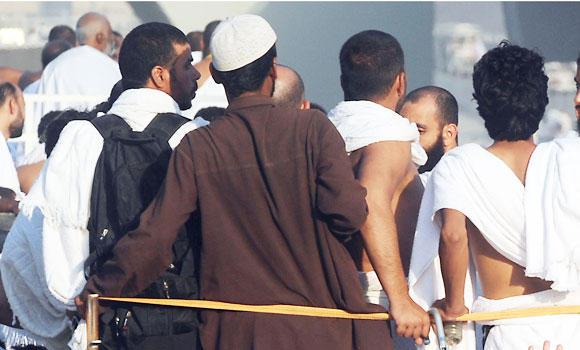
Jeddah, Oct 19: The Passport Department has sent text messages to sponsors and employers to fire their expatriate employees who performed Haj illegally this year, in preparation for their deportation.
The Kingdom's security agencies used new fingerprinting devices in Makkah and the holy sites this year to detect expatriates without Haj permits.
Ali Massoud, who has a barbershop in Jeddah, told Arab News he received a message to fire his workers.
“I have two Egyptian workers who went to Haj without permits. They did not tell me about their plans. I received a text message to end their contracts because they will be deported following their return from Haj,” said Massoud.
Khaled Abbas, a human resources supervisor at a private company, said his office also received SMSs from the passport department.
“We have a number of expat workers who went to perform Haj without permits. We received text messages to end their contracts when they return from Makkah. We will pay all their financial obligations to help them leave the Kingdom,” said Abbas.
Makkah Gov. Prince Khaled Al-Faisal had warned that expatriates found violating Haj rules would be deported and banned for 10 years. The governor also warned Saudi drivers they would face punishment for transporting illegal pilgrims.
Saudi Arabia has reduced the number of illegal pilgrims this year by 65 percent using the new fingerprinting devices, according to an Arabic daily. Prince Khaled said 15,000 illegal pilgrims were prevented from performing Haj this year.





Comments
i was in that case 2014 my finger print is taken at meeqat i did not go for hajj and i came back.before going back to my country i visited to the passport office and said that i have the issue they said no prob you can go.after 2 years now i came here and while entry there is no issue but when i am going back to country stopped me for immigration. i visited all of the pass[port offices and also in the airport they said no issue but while boarding issue raised.my request is for the saudi government that if some one accept his mistake and he needs to clear it legally so it should be given..
some body can help me how to remove haj fingers my iqama is expired and not renewed becoze of haj fingers
some body can help me i will pay as he want but just i need help some body know any person who can remove haj finger
Add new comment